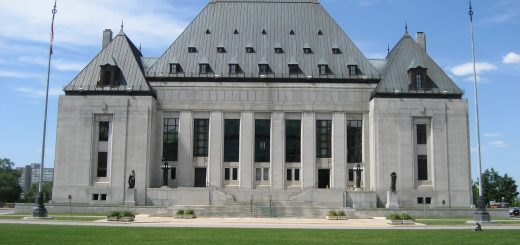Yatar Hero: SCC confirms simultaneous judicial review and appeal in Yatar v TD Insurance

In Yatar v TD Insurance Meloche Monnex, 2004 SCC 8 [Yatar], the Supreme Court of Canada (“SCC”) unanimously ruled that the existence of a statutory right of appeal does not preclude individuals from seeking judicial review for questions not covered by the appeal. Specifically, where the appeal right is restricted to questions of law, judicial review remains open for questions of fact or mixed fact and law.
Addressing the question, the Ontario Divisional Court held that where statute provides for a limited right of appeal, judicial review is available only in “exceptional circumstances” (Yatar v TD Insurance Meloche Monnex, 2021 ONSC 2507, at para 4). The Court of Appeal for Ontario (“ONCA”) more broadly recast the Divisional Court’s language to describe judicial review as available in “rare” or “unusual” situations where a limited appeal right exists (Yatar v TD Insurance Meloche Monnex, 2022 ONCA 446).
Yatar‘s significance lies in the SCC’s clarification that a right of appeal may replace judicial review, but it does not signal legislative intent to preclude it. The Court did not weigh in on whether clear legislative intent such as a privative clause could bar judicial review.
Facts and Judicial History
In 2010, Ms. Yatar was injured in a motor vehicle accident and subsequently applied for benefits from her insurer, TD Insurance (Yatar, para 6). Initially, TD Insurance approved her benefits request, but after several months, denied certain benefits (Yatar, para 7).
In January 2011, TD insurance notified Ms. Yatar by letter that it would cease all benefits because she had not completed a disability certificate. A dispute resolution form was attached to the letter.
The next month, after Ms. Yatar underwent the medical assessment required by her insurer, TD Insurance reinstated her income replacement benefits (“IRB”) but refused her claim for housekeeping and home maintenance benefits. In September 2011, following another medical examination, TD Insurance ended Ms. Yatar’s IRBs as well. Neither the February nor September letters included dispute resolution forms which called into question their validity. Ms. Yatar sought mediation, as required by law at the time, to challenge the benefits denial, which concluded with the mediator’s report issued in January 2014.
In March 2018, she took the matter to the License Appeal Tribunal (“LAT”) to contest the denial (Yatar, para 8). By this time, the relevant legislation had changed, granting the LAT exclusive jurisdiction at first instance, eliminating mandatory mediation, and restricting appeals to legal questions only (Yatar, para 9).
At the time of the accident, the Ontario Insurance Act (RSO 1990, c I.8) set a two-year limitation period to contest denials after the insurer’s refusal to pay benefits. However, this period would be extended by 90 days after the mediator issued its report.
The LAT dismissed Ms. Yatar’s application for being time-barred, calculating that the limitation period extended 90 days after the mediator’s report and ended in April, 2014. Ms. Yatar’s request for reconsideration met the same fate.
Divisional Court
Ms. Yatar pursued an appeal on a question of law and sought judicial review for questions of fact and mixed fact and law (Yatar, para 17). The court dismissed her appeal determining she had not demonstrated an error of law (Yatar, para 19).
The court held that the limited appeal right did not bar it from considering judicial review; however, because judicial review is a discretionary remedy, the court explained it should be declined when alternative remedies are sufficient (Yatar, para 20). The court concluded there were no “exceptional circumstances” warranting judicial review and refused to grant the application (Yatar, para 22).
In essence, the review process available at the LAT and the limited right of appeal were deemed adequate alternative remedies, supporting the proposition that these were not exceptional circumstances justifying judicial review.
Court of Appeal for Ontario
Ms. Yatar contested the Divisional Court’s approach of restricting judicial review in cases with a statutory appeal to only “exceptional circumstances”; and second, she claimed the LAT’s reconsideration decision finding a valid benefits denial was unreasonable (Yatar, para 23).
The court held that the legislature intended to limit recourse to courts by way of the limited right to appeal and that questions of fact or mixed fact and law were generally for the LAT to resolve. The Court of Appeal rephrased the Divisional Court’s “exceptional circumstances” to state that judicial review would only be granted in “rare cases” under the legislative framework of a limited statutory right of appeal. Nonetheless, this limited appeal right did not eliminate the possibility of judicial review entirely (Yatar, paras 24–25).
While judicial review remains open, courts should exercise their discretion to grant this remedy only when alternative remedies and a limited right of appeal prove insufficient to address the specific concern at hand.
Furthermore, the court determined Ms. Yatar failed to show any unreasonableness in the LAT’s decision.
Supreme Court of Canada
The Appellant brought two questions to the SCC:
- Did the Court of Appeal err in its determination that the legislature’s decision to limit the right of appeal from LAT decisions to questions of law restricted the availability of judicial review?
- Did the Court of Appeal err in concluding the LAT adjudicator’s reconsideration decision was reasonable?
Issue 1
In addressing the doctrinal question, Rowe J., writing on behalf of the Court, held that the limited right of appeal does not, on its own, signify legislative intent to curtail judicial review of questions outside the appeal’s scope.
While a judge has discretion to not grant relief, that discretion does not extend to declining to consider the application; at a minimum, a judge must assess the appropriateness of judicial review (Yatar, para 54). Wielding judicial discretion to decline consideration of the application would place that discretion above a constitutional principle (Yatar, paras 49, 61).
However, if in considering the application, a court finds one of the discretionary bases for refusing a remedy, it may decline to hear the merits (Yatar, para 54).The Court noted that in instances where available alternatives to judicial review such as internal administrative remedies have not been exhausted, a judge may exercise discretion to refuse relief (Yatar, para 51). A statutory right of appeal on questions of law is not an adequate alternative because it cannot address questions of fact or mixed fact and law (Yatar, para 62). Similarly, access to internal reconsideration at the LAT is not an adequate remedy when the reconsideration decision is itself the subject of review (Yatar, para 63).
Issue 2
The LAT decision was deemed unreasonable because it failed to consider relevant legal constraints. The Court remanded the matter back to the LAT for reassessment (Yatar, para 76–77).
Despite the LAT’s agreement with Ms. Yatar regarding the invalidity of the February and September 2011 benefit denial letters, it deemed the January 2011 letter valid. For the LAT, this triggered the two-year limitation period which lapsed in April 2014, following the 90-day extension after the mediator’s report (Yatar, para 73). But as Rowe J. highlighted, the IRBs were reinstated between February and September 2011 resetting the limitation period clock, pending valid termination (Yatar, para 74). The SCC acknowledged that it was at least arguable that a new denial of the IRBs was needed to restart the limitation period.
Analysis
The central doctrinal question in Yatar relates to the role of a circumscribed right of appeal in judicial review’s availability. In answering, the Court satisfyingly reaffirmed administrative law first principles: the supervisory power of the superior courts (Yatar, para 45); the constitutional and rule of law importance of judicial review (Yatar, para 46); and legislative intent to restrict or define recourse to courts as it relates to the foregoing principles (Yatar, para 47).
The Respondents argued that while the legislature limited appeals only to questions of law here, it made appeals available on all questions for a handful of other LAT decisions, and since judicial review is a discretionary remedy, the legislature clearly intended for reduced judicial involvement. But this had to fail.
For starters, Vavilov could not have been more clear in holding that a circumscribed right of appeal “does not on its own preclude applications for judicial review of decisions… to which the appeal mechanism does not apply…” (Canada (Minister of Citizenship and Immigration) v Vavilov, 2019 SCC 65, para 52 [Vavilov]). The Respondents did not go so far as to argue judicial review was barred, but that the court must weigh alternative remedies’ adequacy, and the alternatives were sufficient. However, Rowe J. held that the right of appeal on questions of law demonstrates merely an intention to subject LAT decisions to the appellate correctness standard. Nothing can be inferred to suggest the LAT should not be subject to judicial review on other questions (Yatar, para 58).
That is the extent of Yatar’s work: the right to appeal questions of law could not be an adequate alternative remedy because it is limited to questions of law and it alone does note preclude judicial review applications.
Both Vavilov and Yatar are not clear on what legislative accoutrements could preclude judicial review, which signals Yatar’s limited precedential value. Though Yatar is sound on the law at issue, the SCC did not provide an answer for when a circumscribed right of appeal is coupled with actual legislative intention to limit recourse to courts (Yatar, para 50).
The constellation of constitutional and common law principles making up judicial review’s balancing of the rule of law and democracy has yet to come to a unified theory on this issue. However, I note that Vavilov referred to the application of a reasonableness review as being for “courts to fulfil their constitutional duty to ensure that administrative bodies have acted within the scope of their lawful authority” (Vavilov, para 67 [emphasis added]). I would think that a privative clause ousting judicial review would only be capable of doing so to the degree that it doesn’t interfere with that “constitutional duty.” Though, admittedly, until the content of that duty is filled out, this observation doesn’t say much more than that the correct answer is the one that will be correct.
Conclusion
If a privative clause could be taken to oust judicial review (or, if Yatar was decided differently and a circumscribed right of appeal could be taken as legislative intent) the aftermath would likely corrupt the practice of administrative law. As a selective pressure, permitting only questions of law to advance to the courts strikes me as leading to continuous definitional creep of “questions of law,” with questions of fact increasingly pleaded as law.
Nevertheless, it seems likely that when the SCC decides on the matter it will find that a reasonableness review is still permitted when a privative clause purports to bar questions from review by a court, as other courts have recently held (Maritime Employers Association v. Syndicat des débardeurs (Canadian Union of Public Employees, Local 375), 2023 FCA 93, para 115–116; Paladin Security Group Limited v. Canadian Union of Public Employees, Local 5479, 2023 NSCA 86, para 38; Brar v British Columbia (Securities Commission), 2023 BCCA 432, para 43).







Join the conversation